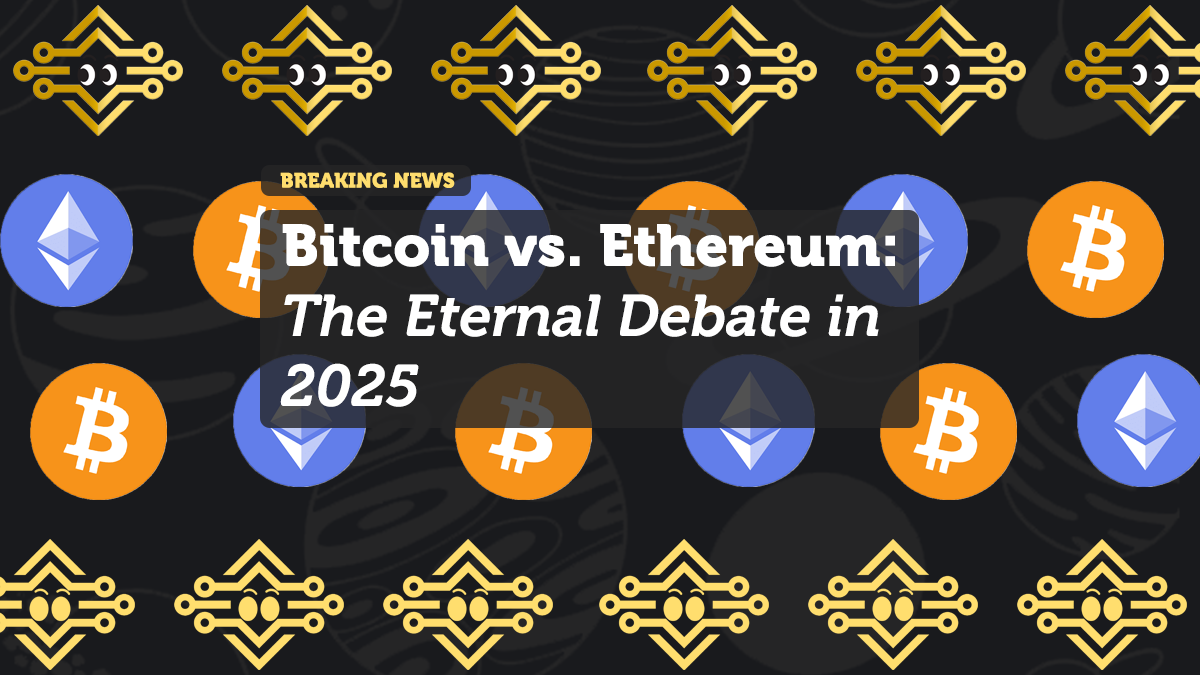
Bitcoin vs. Ethereum: The Eternal Debate in 2025
Bitcoin and Ethereum remain the two most dominant cryptocurrencies, but their roles in the digital asset space continue to evolve. As Bitcoin strengthens its position as a store of value and Ethereum refines its smart contract ecosystem, the question remains:
Which is the better long-term investment?
With recent Ethereum Improvement Proposals (EIPs), Bitcoin ETF approvals, and growing institutional interest, 2025 is shaping up to be another critical year for both assets.
If you had to choose one for the long term, which would it be: Bitcoin or Ethereum?
1. The Core Philosophies: Store of Value vs. Smart Contracts
Bitcoin: Digital Gold and Sound Money
Bitcoin was created as a decentralized, censorship-resistant alternative to fiat currency. Over time, it has evolved into a store of value—a modern equivalent of gold.
- Fixed Supply: Bitcoin is capped at 21 million coins, making it deflationary by design.
- Security and Decentralization: The Bitcoin network remains the most secure and widely adopted blockchain.
- Institutional Adoption: The rise of spot Bitcoin ETFs in 2025 has fueled large-scale investment from hedge funds, pension funds, and banks.
- Low Development Activity: While Bitcoin remains stable and secure, it lacks the flexibility for smart contracts and DeFi applications.
Ethereum: The Smart Contract King
Ethereum has positioned itself as the world’s decentralized computing platform, enabling smart contracts and decentralized applications (dApps).
- Programmability: Unlike Bitcoin, Ethereum allows developers to build and deploy dApps, DeFi protocols, and NFTs.
- Ethereum 2.0 and Proof of Stake: Ethereum’s transition to Proof of Stake (PoS) has reduced its energy consumption by over 99 percent and improved scalability.
- EIP Updates: Ethereum’s EIP-4844 (Proto-Danksharding) in 2025 has significantly reduced gas fees, making it more accessible for mainstream adoption.
- Institutional Growth: While Bitcoin leads in ETFs, Ethereum spot ETFs are gaining traction, increasing institutional exposure.
2. Market Share and Institutional Adoption
| Metric | Bitcoin (BTC) | Ethereum (ETH) |
|---|---|---|
| Market Cap | ~$1.8 trillion | ~$800 billion |
| Daily Transaction Volume | $30 billion | $15 billion |
| Institutional ETFs Approved | Multiple spot Bitcoin ETFs | Ethereum ETF applications pending approval |
| DeFi Total Value Locked (TVL) | Minimal | ~$80 billion |
| Network Fees (Avg. 2025) | Low, due to limited on-chain usage | Significantly lower post-EIP-4844 |
| Developer Activity | Slower, focused on security and scaling | Leading in Web3, DeFi, and AI integrations |
Institutional Investors Favor Both, but for Different Reasons
- Bitcoin: Viewed as a hedge against inflation and an alternative to gold.
- Ethereum: Recognized for its utility in DeFi, NFTs, and AI-powered dApps.
3. Bitcoin vs. Ethereum: Key Developments in 2025
Bitcoin’s Strengths in 2025
✅ Spot Bitcoin ETFs drive institutional demand
✅ Lightning Network adoption increases BTC utility for payments
✅ Digital gold narrative remains strong in economic uncertainty
Ethereum’s Growth in 2025
- EIP-4844 reduces transaction costs, improving scalability
- Ethereum ETF approval could drive institutional demand
- Integration with AI-driven dApps expands Ethereum’s use cases
Challenges for Both
- Bitcoin’s lack of programmability limits its use cases outside of store-of-value
- Ethereum’s transition to PoS faces centralization risks with staking pools
- Both assets are subject to regulatory uncertainty across different jurisdictions
4. The Role of CryptoLiveLeak in Shaping the Debate
How CryptoLiveLeak Engages the Crypto Community
- Hosting in-depth discussions on institutional adoption, scalability, and blockchain upgrades
- Providing expert insights on market trends and regulatory developments
- Facilitating debates between Bitcoin and Ethereum advocates through engaging content
CryptoLiveLeak continues to be a leading voice in blockchain analysis and education, helping investors and enthusiasts navigate the evolving landscape.
For those looking to stay informed on BTC, ETH, and the broader crypto ecosystem, CryptoLiveLeak is the go-to source for reliable news and analysis.
5. The Long-Term Outlook: Which Asset Will Dominate?
Why Bitcoin Could Win the Long-Term Battle
- Scarcity and institutional demand position BTC as a long-term store of value.
- Regulatory clarity for Bitcoin ETFs strengthens its role in traditional finance.
- Adoption as digital gold continues to grow globally.
Why Ethereum Could Overtake Bitcoin
- Ongoing upgrades and EIPs keep Ethereum technologically ahead.
- DeFi, NFTs, and AI applications ensure strong developer activity.
- Institutional investment in ETH is growing, potentially closing the market cap gap.
Could Both Coexist?
Rather than one replacing the other, it is increasingly likely that Bitcoin and Ethereum will serve different roles in the financial ecosystem.
- Bitcoin remains the top choice for preserving value and hedge investments.
- Ethereum continues to be the backbone of Web3, DeFi, and digital asset innovation.
Final Thoughts: Bitcoin or Ethereum?
The Bitcoin vs. Ethereum debate will continue as both assets evolve. Whether you prioritize security and scarcity (BTC) or programmability and innovation (ETH), both cryptocurrencies offer unique value in the blockchain space.
If you had to choose one for the long term, which would it be: Bitcoin or Ethereum?























